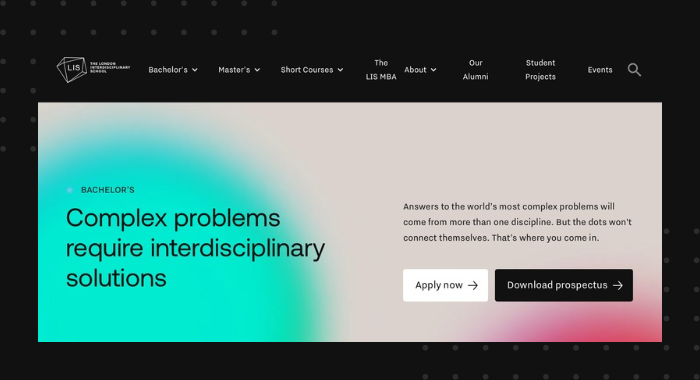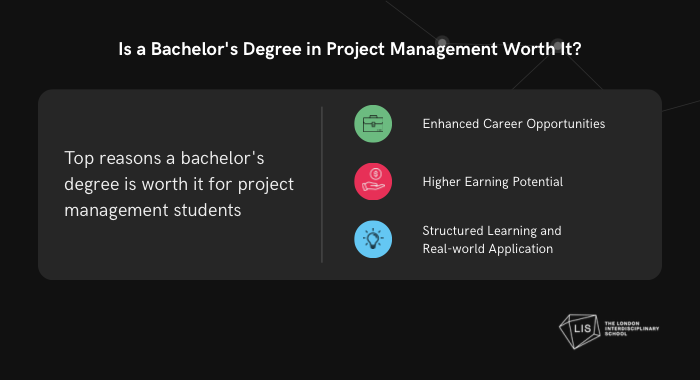Choosing a Bachelor’s in Project Management: A Complete Guide

There’s no shortage of options for earning a bachelor’s degree in project management.
Many programmes build a strong foundation in project management methodologies and disciplines. But to excel, future project managers also need to develop analytical and research skills that help turn plans into successful outcomes.
At LIS, we recognise the growing demand for skilled project managers who can think innovatively and solve new and unpredictable challenges.
This blog explores a selection of great bachelor's degrees for aspiring project managers and how LIS can help you achieve interdisciplinary skills to stand out in this field.
Table of Contents:
- Bachelor's Degrees for Project Management Careers
- Additional Courses for Project Management Bachelor’s Degree Students
- How LIS's Interdisciplinary Approach Benefits Project Management Students
- Is a Bachelor’s Degree in Project Management Worth It?
- Get a Bachelor’s Degree for Project Managers with LIS
A bachelor’s degree is an excellent way to get started if you want to become a successful project manager. You can gain project management knowledge at a foundation level, making it much easier to break into or transition into this industry.
Here are some of the best types of bachelor’s degrees for aspiring project managers.
1. Bachelor of Arts and Science (BASc) in Project Management
A BASc degree combines the study of art and sciences, delivering students with an interdisciplinary approach to project management skills. At LIS, our BASc degree specialises in problems and methods, helping students understand how to solve real-world complex issues with innovative solutions.
Although our bachelor’s programme doesn’t focus on project management specifically, its interdisciplinary theme prepares you for a career in various fields, including project management. You’ll learn core skills across multiple disciplines, making it easier for you to launch a new job or change your profession at a later stage.
This degree is ideal for aspiring project managers who want transferable skills that equip them to work in unpredictable settings and solve challenges as they arise.

Entry Requirements:
- A-level qualifications or equivalent, including at least one relevant subject such as Business Studies, Economics, or Mathematics.
- BTEC Level 3 National Extended Diploma in a related field.
- English language proficiency (IELTS score of 6.5 or equivalent)
- At LIS, we offer a flexible admissions process, accommodating students from all walks of life depending on their passion and dedication to interdisciplinary learning.
Ideal For:
- Students who want careers in sectors where project management skills are essential, or to launch a career as a project manager.
- Professionals seeking to formalise their expertise with a project management degree.
- Students interested in combining analytical, organisational, and leadership skills to deliver projects successfully across diverse industries.
2. Bachelor’s in Business Administration (BBA)
A bachelor’s in business administration (BBA) specialising in project management focuses on core business knowledge and project management fundamentals. These programmes will help you become an effective project manager while gaining the expertise required to lead teams to success and make strategic business decisions.
In addition to project management skills, you’ll gain expertise in business-related disciplines, such as accounting, finance, marketing and management.
Entry Requirements:
- A-level qualifications or equivalent, including at least one relevant subject such as Business Studies, Economics, or Mathematics.
- BTEC Level 3 National Extended Diploma in a related field.
- English language proficiency (IELTS score of 6.5 or equivalent)
Ideal For:
- Students aiming to develop broad business administration skills and specialist project management expertise.
- Aspiring managers who want to lead projects in finance, marketing, operations, or international business sectors.
- Professionals wanting to advance into leadership roles require strategic business knowledge and project management skills.
3. Bachelor of Science (BS) in Project Management
A Bachelor of Science (BS) in project management emphasises this field's technical and analytical aspects. You’ll focus on practical training and analytical thinking as a project manager across various industries. These degree programmes focus on skills such as project planning, risk analysis, contract management, procurement, and hands-on experience.
Entry Requirements:
- A-level qualifications or equivalent, including at least one relevant subject such as Business Studies, Economics, or Mathematics.
- BTEC Level 3 National Extended Diploma in a related field.
- English language proficiency (IELTS score of 6.5 or equivalent).
Ideal For:
- Learners who want to develop a strong understanding of the scientific principles, tools, and techniques applied in project management.
- Professionals who want to progress into project management roles that require high-level problem-solving, risk management, and technical expertise.
- Aspiring project managers are interested in a more technical and analytical approach to project management within industries like construction, engineering, or IT.
4. Bachelor of Arts (BA) in Project Management
In contrast to a BS in project management, bachelor’s degrees take a broader approach and often explore leadership skills, communication with key stakeholders, conflict resolution, and organisational behaviour. While BS degrees are more specialised and technical, a BA degree is better suited to students who want a more human-focused, liberal approach to learning project management.
Entry Requirements:
- A-level qualifications or equivalent, including at least one relevant subject such as Business Studies, Economics, or Mathematics.
- BTEC Level 3 National Extended Diploma in a related field.
- English language proficiency (IELTS score of 6.5 or equivalent).
Ideal For:
- Aspiring project managers who want to focus on leadership, communication, and organisational abilities within various arts, media, or non-profit industries.
- Those looking to gain a strong foundation in the social sciences, combined with practical project management skills.
- Professionals seeking a well-rounded education in project management that covers human behaviour, decision-making, and management strategies.
Consider taking additional courses upon completing your bachelor's degree or improving eligibility to study one of these programmes. Many short courses can equip you with the research methods and necessary knowledge to stand out in the project management job market and help you establish well-rounded expertise.
While completing short courses comes at additional costs, it can help secure high-level positions with increased earning potential.
These are a few top short courses for students pursuing a bachelor's degree in project management.
Cross-Functional Leadership
The cross-functional leadership course by LIS requires two months of study and covers interdisciplinary methods for leading teams with diverse expertise and backgrounds. This course is ideal for aspiring project managers, as it provides insight into what it takes to become a leader who can manage diverse priorities, perspectives, and goals.
Previous course graduates have come from world-renowned organisations such as NESTA, Google, and Airbnb. Whether you're in the public or business sectors or unsure about how you want to pursue your project management career, this course can give you a competitive advantage.

Course Curriculum:
- Complexity: Study different kinds of complexity and properties of complex systems.
- Visualisation: Practice visual techniques for mapping systems and simplifying ideas.
- Communication: Learn how to communicate intentionally and manage people with different communication styles.
- Systems Thinking: Gain insights into systemic relationships.
- Collaboration: Recognise opportunities for enhancing cooperation through collective intelligence and running more effective meetings.
- Problem-solving: Enable your team to define and analyse problems.
- Integration: Master interdisciplinary techniques in a professional context.
Course Fees:
- £2000 (Discounts available for self-funders, startups, and non-profits)
APM Project Management Qualification (PMQ)
The PMQ certification is one of the top project management courses, accredited by the Association for Project Management (APM). It delivers a comprehensive understanding of project management and is intended for students with two to three years of experience who want to advance their expertise and careers. However, there aren’t any formal prerequisites to complete this course.
This course is available online and takes about two to three months to complete. Then, you’ll have to write and pass a 2.5-hour exam to receive your certification.
Course Curriculum:
- Life Cycles
- Governance Arrangements
- Sustainability
- Business Case
- Procourment
- Transition Management
- Benefits Management
- Stakeholder Engagement
Course Fees:
- £860 to £4,160 (Depending on the training provider and course format)

While traditional bachelor's degrees focus on specific project management disciplines, LIS takes an interdisciplinary approach, providing students with a broader set of skills vital in today's dynamic and rapidly changing business environment.
Leadership and Adaptability
Our interdisciplinary programmes are designed to help you navigate complex business challenges, think critically, and adapt quickly to changing circumstances. These skills are crucial for project managers, as they need to guide teams through unpredictable scenarios, manage stakeholder expectations, and make informed decisions under pressure.
Standard project management undergraduate degrees prepare students for this field by covering financial control, risk management, resource management, and similar skills. At LIS, our BASc degree focuses on three elements to help students become adaptable leaders who stand out in the job market.
- Complex Problems: Learners can study real-world problems, like climate change, the future of cities, and inequality. You’ll engage in various disciplines, gaining diverse perspectives on those problems.
- Interdisciplinary Methods: In addition to interdisciplinary methods, students will focus on both quantitative and qualitative techniques.
- Real Organisations: Throughout your degree, you can learn the value of making an impact by working with actual companies and helping them solve problems.
Problem-Solving Across Disciplines
LIS fosters creativity and problem-solving across disciplines, encouraging you to tackle challenges from multiple angles. This flexibility is key for project managers, who must find solutions that balance project goals with resource constraints, timelines, and stakeholder interests. Students will learn to think critically and creatively, rather than following a one-size-fits-all approach.
Here’s an overview of the modules in our BASc degree programme that can help aspiring project managers:
- Problems 1b: Drawing and understanding connections, stakeholder mapping and working with external organisations.
- Problems 1c: Project management, networking and independent research.
- Qualitative Methods 1a: Language and Communication: Thematic analysis, close reading and participant observation.
- Problems 2b: Architecture, prototyping and project management.
- Problems 2c: Professional communication, mixed methods research and independent research.
At the end of your programme, aspiring project professionals can demonstrate their quantitative and qualitative skills in a capstone project. This is an opportunity to work on any problem you’re most passionate about.
Networking and Student Resources
Beyond our interdisciplinary teaching and learning methods, we understand how crucial it is for future change-makers to network with like-minded professionals and get the support they need to excel. Whether local or international students, LIS provides networking opportunities with an active community of over 200 employers and organisations.
Students can establish professional connections through workshops, site visits, well-being and guest talks. Our career managers will also make one-on-one personal introductions on behalf of the students. Alongside networking opportunities, LIS students can access various career, financial, and well-being resources to guide them through their studies.
These resources include:
- One-on-one career mentorship
- Social events
- Student clubs and societies
- Wellbeing workshops
- Wellbeing advisors
Flexible Admissions Process
LIS welcomes students from all academic and professional backgrounds. We thrive on diversity and value students with practical skills, an interest in interdisciplinary learning, and relevant professional experience.
If you don't have traditional academic qualifications but believe you are ready to take on our BASc degree, our admissions team considers every application on a case-by-case basis. We're committed to delivering fair admissions and making career success through interdisciplinary learning accessible.
Here's an idea of what to expect when applying for LIS's BASc degree:
- Complete the online application.
- Submit your critical reflection, a personal statement in which you choose a problem or phenomenon and demonstrate how interdisciplinary methods would solve it.
- After four weeks of submission, you receive your offer if you're accepted.

Earning a bachelor's degree can be helpful for professionals wanting a successful career in project management. These are the top reasons a bachelor's degree is worth it for project management students.
Enhanced Career Opportunities
Upon successful completion of your bachelor’s degree in project management, you’ll find it much easier to secure entry-level positions. In some cases, with enough experience, and depending on the employer, you may also qualify for higher-level career opportunities. What matters most is to show potential employers how you can make a real impact in their workplace through your interdisciplinary training.
Higher Earning Potential
According to recent research, the average salary in 2024 for professionals with an undergraduate degree was £26,500 compared to non-graduates who earned £19,500. Students who have completed university degrees appeal more to employers as their qualifications validate their expertise and prove how they can get involved in their project management operations.
Structured Learning and Real-World Application
While professional experience is vital, formal education offers structured, research-backed frameworks that are difficult to acquire. Many bachelor's programmes include practical assignments, industry projects, and taught modules. With a bachelor's degree in project management, you gain both theoretical knowledge and hands-on skills.
A bachelor's degree is worthwhile for students interested in launching successful project management careers. These undergraduate degrees can enhance job opportunities, increase earning potential, and provide a structured learning experience.
At LIS, we offer an interdisciplinary bachelor's programme that helps project managers become complex problem-solvers and stand out in the job market. In addition to our BASc degree, students can find short courses to deepen their understanding of leadership and project management and propel their careers forward.
Ready to get a bachelor's degree for your project management career? Contact LIS today.
Share this story
Sign up for our newsletter
Don't miss out on important updates including course information, new announcements, Open Day dates and the latest LIS news.

.png)











































.svg)

.svg)









.webp)
This is a comment related to the post above. It was submitted in a form, formatted by Make, and then approved by an admin. After getting approved, it was sent to Webflow and stored in a rich text field.